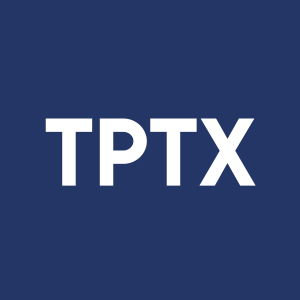Turning Point Therapeutics Presents Updated Preliminary Clinical Data for Repotrectinib and Elzovantinib (TPX-0022) at 2021 AACR-NCI-EORTC Conference and Provides Regulatory Updates
Rhea-AI Summary
Turning Point Therapeutics, Inc. (NASDAQ: TPTX) announced promising interim clinical trial data for its lead drugs, repotrectinib and elzovantinib, at the AACR-NCI-EORTC conference. The TRIDENT-1 study showed confirmed objective response rates (cORR) of 30-39% in ROS1+ advanced non-small cell lung cancer (NSCLC) patients pretreated with prior TKIs, with a notable 53% cORR in those with the G2032R mutation. Elzovantinib also demonstrated a cORR of 36% in MET TKI-naïve NSCLC patients. The company plans to engage with the FDA for further development, indicating strong momentum in its clinical pipeline.
Positive
- Repotrectinib achieved cORR of 39% in TKI-pretreated NSCLC (EXP-2) and 30% in two prior TKI-pretreated patients (EXP-3).
- 53% cORR in ROS1+ TKI-pretreated patients with G2032R mutation.
- Elzovantinib showed cORR of 36% in MET TKI-naïve NSCLC patients.
- The company plans discussions with the FDA for regulatory pathways on repotrectinib and elzovantinib.
Negative
- Ongoing clinical trials may face potential delays based on FDA feedback.
- The need for additional intermediate dosing strategies could indicate uncertainties in elzovantinib's development timeline.
News Market Reaction
On the day this news was published, TPTX declined 23.31%, reflecting a significant negative market reaction.
Data tracked by StockTitan Argus on the day of publication.
- Repotrectinib Demonstrates Clinical Activity Across Multiple ROS1+ TKI-Pretreated NSCLC Cohorts, with Confirmed Objective Response Rates of 30-39 Percent in TRIDENT-1 Study
- Repotrectinib Demonstrates Confirmed Objective Response Rate of 53 Percent in ROS1+ TKI-Pretreated NSCLC Patients with G2032R Solvent Front Mutation
- Elzovantinib (TPX-0022) Demonstrates Confirmed Objective Response Rates of 36 and 33 Percent, Respectively, in MET TKI-Naïve NSCLC and Gastric/Gastroesophageal Junction (GEJ) Cancer Patients Harboring Genetic Alterations in MET in SHIELD-1 Study
- Repotrectinib Early Clinical Data in NTRK+ TKI-Naïve and TKI-Pretreated Solid Tumors to be Presented in Plenary Session on October 8 at 10:05 a.m. ET
- Conference Call Scheduled for October 7 at 8 a.m. ET
SAN DIEGO, Oct. 07, 2021 (GLOBE NEWSWIRE) -- Turning Point Therapeutics, Inc. (NASDAQ: TPTX), a precision oncology company developing next-generation therapies that target genetic drivers of cancer, today announced the presentation of additional preliminary clinical data from ongoing trials for lead drug candidate repotrectinib, and elzovantinib (TPX-0022), a novel MET/SRC/CSF1R inhibitor. These data are being presented at the Virtual International Conference on Molecular Targets and Cancer Therapeutics hosted by the American Association for Cancer Research (AACR), the National Cancer Institute (NCI), and the European Organisation for Research and Treatment of Cancer (EORTC) being held October 7-10.
“We are encouraged by the updated clinical data for repotrectinib and elzovantinib, both of which have shown activity in areas of high unmet need,” said Mohammad Hirmand, M.D., chief medical officer. “We continue to work toward bringing these important medicines to patients as quickly as possible.”
Repotrectinib Updated Phase 2 Data from TRIDENT-1 Study from ROS1-Positive TKI-Pretreated Advanced Non-Small Cell Lung Cancer Cohorts (EXP-2, EXP-3, EXP-4)
The updated Phase 2 TRIDENT-1 dataset utilizes an August 26, 2021 data cutoff. The safety analysis includes 301 treated patients from the pooled Phase 1 and Phase 2 portions of TRIDENT-1 across all cohorts, and the preliminary efficacy analysis includes 72 evaluable patients from the pooled Phase 1 and Phase 2 portions of TRIDENT-1 in the ROS1-positive TKI-pretreated advanced non-small cell lung cancer (NSCLC) cohorts (EXP-2, EXP-3, EXP-4). Phase 2 patients included in the efficacy analysis had baseline measurable disease and at least one post-baseline evaluable scan or were off treatment prior to first post-baseline scan. Responses were confirmed with a subsequent scan at least 28 days later per RECIST 1.1 and were determined by physician assessment for Phase 2 patients. Phase 1 patients included in the efficacy analysis were treated at or above the Phase 2 dose, with responses assessed by blinded independent central review (BICR). The Phase 1 data cutoff date was July 22, 2019 for responses and August 26, 2021 for duration of treatment.
The findings were reported in a pre-recorded presentation by Jessica Lin, M.D., assistant professor of Medicine at Harvard Medical School and attending physician at the Massachusetts General Hospital, that is available on October 7 at 9 a.m. ET on the meeting website.
Pooled Phase 1 and Phase 2 Preliminary Efficacy Analysis (n=72)
- In the ROS1-positive advanced NSCLC population pretreated with one prior TKI and prior platinum-based chemotherapy (EXP-2: n=23), the confirmed Objective Response Rate (cORR) was
39% (95% CI: 20-61). Duration of response ranged from 1.8+ to 11.1 months, and the duration of treatment in the 23 patients ranged from 0.7 to 44.5+ months with five patients remaining on treatment. - In the ROS1-positive advanced NSCLC population pretreated with two prior TKIs without prior chemotherapy (EXP-3: n=10), the cORR was
30% (95% CI: 7-65). Duration of response ranged from 1.9+ to 12.9+ months, and the duration of treatment in the 10 patients ranged from 0.5 to 18.1+ months with two patients remaining on treatment. - In the ROS1-positive advanced NSCLC population pretreated with one prior TKI without prior chemotherapy (EXP-4: n=39), the cORR was
38% (95% CI: 23-55). As of the cutoff date, three patients had unconfirmed partial responses (uPRs), all of which have been confirmed since the cutoff date and are included in the cORR. The38% cORR is an update since the pre-recorded presentation. Duration of response ranged from 0.8+ to 15.0+ months, and the duration of treatment in the 39 patients ranged from 0.5 to 19.2+ months with 21 patients remaining on treatment. - Across EXP-2, EXP-3 and EXP-4, 18 patients (
25% ) had a ROS1 resistance mutation detected, 15 of which had G2032R solvent front mutations (SFMs). The cORR was50% (95% CI: 26-74) in 18 patients with any resistance mutation and53% (95% CI: 27-79) in patients with a G2032R SFM which included two complete responses (CRs).
Preliminary Safety Analysis (n=301)
- Repotrectinib was generally well tolerated.
- The most frequently reported treatment-emergent adverse event (TEAE) was low-grade dizziness (
60% ) of which76% of reported cases were grade 1. Eleven patients (4% ) reported ataxia in the absence of dizziness. No events of dizziness or ataxia led to treatment discontinuation. - Dose modifications due to TEAEs included
27% of patients who had dose reduction and11% who had drug discontinuation.
Elzovantinib Updated Phase 1 Dose Finding Data from SHIELD-1 Study
The updated data from the Phase 1 dose finding portion of SHIELD-1 utilizes an August 23, 2021 data cutoff. Fifty-four patients were treated across seven dose levels. Patients included those with NSCLC (n=31), gastric or gastroesophageal junction (GEJ) cancer (n=9), colorectal cancer (CRC) (n=5), and other solid tumors (n=9) harboring genetic alterations in MET. Of the 54 patients,
The findings were reported in a pre-recorded presentation by David Hong, M.D., Department of Investigational Cancer Therapeutics, The University of Texas MD Anderson Cancer Center, that is available on October 7 at 9 a.m. ET on the meeting website.
Preliminary Safety Analysis (n=54)
- Elzovantinib was generally well tolerated.
- The most frequently reported TEAE was dizziness (
65% ) of which94% of reported cases were grade 1 or grade 2. - Dose modifications due to TEAEs included
39% of patients who had dose reduction and6% who had drug discontinuation. - Two dose-limiting toxicities of grade 3 vertigo and grade 2 dizziness occurred at 120 mg QD.
- Peripheral edema was reported in
20% of patients and none were grade 3 or higher. No ILD/pneumonitis of any grade was reported. Additionally, no treatment related grade 3 or higher ALT/AST elevation was reported.
Preliminary Efficacy Analysis (n=46)
- A total of 46 patients were evaluable for efficacy, including 32 who were MET TKI-naïve; 11 with NSCLC, nine with GC/GEJ cancer, and 12 with other solid tumors. Of the 11 NSCLC patients, five had MET exon 14 skipping, four had MET amplification, and two had MET oncogenic mutations. Of the nine GC/GEJ cancer patients, eight had MET amplification and one had MET fusion. Of the 12 patients with advanced other solid tumors, seven had MET amplification, three had MET exon 14 skipping, and two had MET fusions.
- Among the 11 MET TKI-naïve NSCLC patients, four achieved confirmed responses for a cORR of
36% (95% CI: 11-69) across all dose levels. Of the four confirmed responders, one had MET exon 14 skipping, one had MET amplification with a gene copy number (GCN) of 7, and two had MET oncogenic mutations. The duration of response (DOR) range (n=4) was 1.8+ to 15+ months, with the longest duration in a MET exon 14 skipping NSCLC patient previously treated with immunotherapy, who remained in a response for 15+ months and on treatment for 18+ months. - Among the nine MET TKI-naïve GC/GEJ patients, three achieved confirmed responses for a cORR of
33% (95% CI: 7-70) across all dose levels. Of the three responders, all had MET amplification with GCNs of 12, 14 and 25. The duration of response (DOR) range (n=3) was 5.2 to 12.9+ months. - Among the 12 patients with advanced other solid tumors, one patient with MET amplified colorectal cancer with a GCN of 34 achieved a confirmed response.
- 14 patients were MET TKI-pretreated; 13 with NSCLC and one with liver cancer. This population was heavily pretreated with
36% having received at least five lines of prior therapy. The median number of prior therapies was three (range 1 to 6). Seven of 13 NSCLC patients achieved stable disease as their best response for a clinical benefit rate of54% .
Regulatory Updates
Repotrectinib
At the company’s anticipated meeting with the U.S. Food and Drug Administration (FDA) in the first half of 2022 to discuss the topline BICR results from EXP-1 of the TRIDENT-1 study, the company also plans to discuss available BICR data in at least 50 patients from the ROS1-positive TKI-pretreated NSCLC cohorts of the study, with at least six months of follow-up for the majority of responders.
Elzovantinib
At a recent End of Phase 1 Meeting with the FDA, the company received guidance on the design of the planned Phase 2 portion of the SHIELD-1 study and feedback on the recommended Phase 2 dose. The meeting focused on the potential next steps for elzovantinib in patients with NSCLC.
In the initial feedback, the FDA indicated that the company’s Phase 2 design may be acceptable to support a future NDA submission and guided that the adequacy of the data to support accelerated approval would consider the magnitude and duration of responses in a risk-benefit analysis, and will depend on available therapies and the treatment landscape for NSCLC at the time of a potential future NDA submission.
The FDA recommended that the company explore an additional intermediate dose level using the QD titration to BID dosing strategy in at least six to 10 patients prior to starting the Phase 2 portion of the study. The company plans to enroll at least six to 10 patients at the dose level of 60 mg QD increased to 60 mg BID after 14 days in the SHIELD-1 Phase 1 to evaluate safety, tolerability and potential anti-tumor activity of elzovantinib. Based on the FDA feedback, the company plans to revise SHIELD-1 into a potentially registrational Phase 1/2 study and initiate the Phase 2 portion of SHIELD-1 in 2022 pending FDA feedback on data from the intermediate dose level.
In addition, FDA feedback on the development path for elzovantinib in gastric/gastroesophageal junction (GEJ) cancer is pending.
“We are pleased with the continued enrollment momentum within the TRIDENT-1 study and look forward to multiple discussions with the FDA regarding the ROS1 and TRK patient populations for repotrectinib in 2022,” said Athena Countouriotis, M.D., president and chief executive officer. “We look forward to our next interactions with the FDA for elzovantinib and advancing the development of both programs.”
Webcast/Conference Call Information
Turning Point will host a webcast and conference call on October 7 at 8 a.m. ET / 5 a.m. PT to discuss the clinical data presented at the AACR-NCI-EORTC Conference. Athena Countouriotis, M.D., president and chief executive officer of Turning Point, will host the virtual event for investors and will be joined by Mohammad Hirmand, M.D., chief medical officer. In addition, Alexander Drilon, M.D., chief, Early Drug Development Service, Memorial Sloan Kettering Cancer Center, and David S. Hong, M.D., Department of Investigational Cancer Therapeutics, The University of Texas MD Anderson Cancer Center, will also be available on the call.
The event will be accessible through the “Investors” section of www.tptherapeutics.com or by dialing (877) 388-2118 (in the United States) or (470) 495-9489 (outside the U.S.) using conference ID 5967629. A replay will be available shortly after the live event through the “Investors” section of www.tptherapeutics.com.
About Turning Point Therapeutics Inc.
Turning Point Therapeutics is a clinical-stage precision oncology company with a pipeline of internally discovered investigational drugs designed to address key limitations of existing cancer therapies. The company’s lead drug candidate, repotrectinib, is a next-generation kinase inhibitor targeting the ROS1 and TRK oncogenic drivers of non-small cell lung cancer and advanced solid tumors. Repotrectinib, which is being studied in a registrational Phase 2 study in adults and a Phase 1/2 study in pediatric patients, has shown antitumor activity and durable responses among kinase inhibitor treatment-naïve and pre-treated patients. The company’s pipeline of drug candidates also includes TPX-0022, targeting MET, CSF1R and SRC, which is being studied in a Phase 1 trial of patients with advanced or metastatic solid tumors harboring genetic alterations in MET; TPX-0046, targeting RET, which is being studied in a Phase 1/2 trial of patients with advanced or metastatic solid tumors harboring genetic alterations in RET; and TPX-0131, a next-generation ALK inhibitor, which is being studied in a Phase 1/2 trial of previously treated patients with ALK-positive advanced or metastatic non-small cell lung cancer. The company is driven to develop therapies that mark a turning point for patients in their cancer treatment. For more information, visit www.tptherapeutics.com.
Forward Looking Statements
Statements contained in this press release regarding matters that are not historical facts are “forward-looking statements” within the meaning of the Private Securities Litigation Reform Act of 1995. Such forward-looking statements include statements regarding, among other things, the efficacy, safety and therapeutic potential of repotrectinib and elzovantinib, the results, conduct, progress and timing of the TRIDENT-1 and SHIELD-1 clinical studies, plans regarding future regulatory submissions, and the regulatory approval paths for repotrectinib and elzovantinib. Because such statements are subject to risks and uncertainties, actual results may differ materially from those expressed or implied by such forward-looking statements. Words such as “plans”, “will”, “believes,” “anticipates,” “expects,” “intends,” “goal,” “potential” and similar expressions are intended to identify forward-looking statements. These forward-looking statements are based upon Turning Point Therapeutics’ current expectations and involve assumptions that may never materialize or may prove to be incorrect. Actual results could differ materially from those anticipated in such forward-looking statements as a result of various risks and uncertainties, which include, without limitation, risks and uncertainties associated with Turning Point Therapeutics’ business in general, risks and uncertainties related to the impact of the COVID-19 pandemic to Turning Point Therapeutics’ business and the other risks described in Turning Point Therapeutics’ filings with the Securities and Exchange Commission (SEC), including its quarterly report on Form 10-Q filed with the SEC on August 9, 2021. All forward-looking statements contained in this press release speak only as of the date on which they were made. Turning Point Therapeutics undertakes no obligation to update such statements to reflect events that occur or circumstances that exist after the date on which they were made.
Contact:
Scott Lipman
ir@tptherapeutics.com
858-876-3985








